
Bali Belly, Delhi Belly, Peru Poo, the Rangoon Runs. Call it what you like, it can put more than a damper on your holiday.
With 1.25 million Australians making the pilgrimage to Bali each year, it’s our number one holiday destination. But it’s not all deckchairs on the beach and cocktails around the pool.
The Travel Doctor estimates 30-50% of Aussie tourists will experience a bout of Bali Belly. That’s thousands of people holed up in their hotel room suffering instead of enjoying the sights.
What is Bali Belly?
Bali Belly is another name for traveller’s diarrhoea caused by consuming contaminated food or water. Usually, Bali Belly is caused by bacteria. The bacteria most likely to make you sick with a stomach bug is escherichia coli (e coli) as well as shigella s and salmonella. Viruses like norovirus and rotavirus cause the same symptoms. Parasites such as giardia lamblia are another cause.
What are the Symptoms of Bali Belly?
Symptoms usually start within 1 to 10 days. The symptoms of bali belly include:
- Bloated stomach, stomach cramps and abdominal pain
- Diarrhoea - loose & watery stools
- Vomiting
- Dizziness
- Sweating
- Lethargy
- Fever or high temperature
Why Are You So at Risk in Bali?
Australians make so many trips to Bali that many travellers treat their holiday like they are visiting another state in Australia. Familiarity can breed complacency, so be aware of the following risks to enjoy a Bali Belly-free holiday:
Water
Bali is a developing country and the water supply is not fit for human consumption.
Food
The warm tropical, humid weather means bacteria on food can grow at much faster rates in Bali than in most parts of Australia.
Some cooks in Indonesia may not be educated or have the equipment needed for safe food handling practice. They may serve food that could cause food poisoning due to:
- poor refrigeration during transit and storage
- cross-contamination during handling
- food not being kept hot enough after cooking
- reheating food after cooking
Also, the personal hygiene of food handlers and preparers may be poor. Any infection or bacteria they have may pass to consumers on the food they have handled.
Prevention: How do You Avoid Bali Belly?
Sometimes you take all the precautions to avoid Bali Belly but are still struck down with it, while others eat and drink whatever they like and don’t suffer any effects. Many of the risks come from consuming water. To avoid Bali Belly take these steps:
- Only drink boiled or bottled water - Bali’s scheme water is not safe to consume
- Wash your hands or use hand sanitiser before eating
- Order drinks without ice if you are unsure if tap water was used
- Don’t wash any fruit or vegetables in tap water
- Leave a note in the bathroom to remind yourself to use bottled water for brushing your teeth. Don’t ingest any water while you are taking a shower.
- Only eat freshly cooked food, avoid food that is sitting out at room temperature
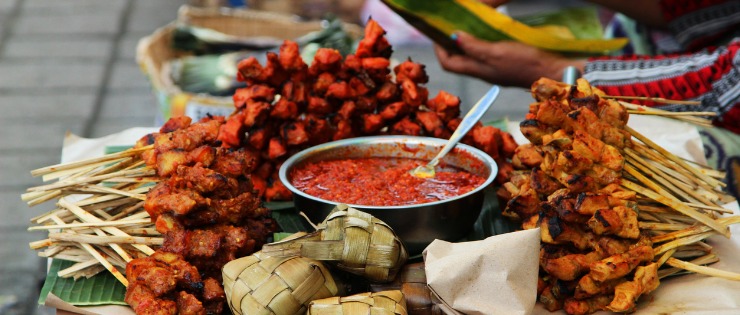
What Can You Not Eat in Bali?
Tasty Indonesian food you can buy dirt cheap is one of the draw cards for visitors but it’s also the main source of food poisoning.
To reduce your risks, we recommend not eating these foods in Bali:
- Food from street vendors - eat at hotels and reputable restaurants
- Leafy green vegetables and salads - they could be contaminated after being washed with tap water
- Rare or undercooked meats. Undercooked meat may contain bacteria that causes food poisoning.
- Seafood
- Chicken particularly if it’s not fully cooked
- Hot food that has gone cold at the time of serving
- Buffets - food sitting out at room temperature can easily contain high levels of bacteria
- Unpasteurized dairy products
- Wet glasses, cutlery and plates
- Peeled fruit
Remember to Wash your Hands
Touching a door handle can be enough to pass on bacteria, viruses and parasites. When out and about, keep your hands off your face and - most importantly - wash your hands before eating anything in Bali.
It’s best to use hand sanitiser all over both hands before a snack or meal. Carry a bottle of sanitiser with you everywhere. Baby wipes are also handy for cleaning dirty hands and faces. Use an alcohol-based sanitiser to kill the germs even if you have washed your hands with water.
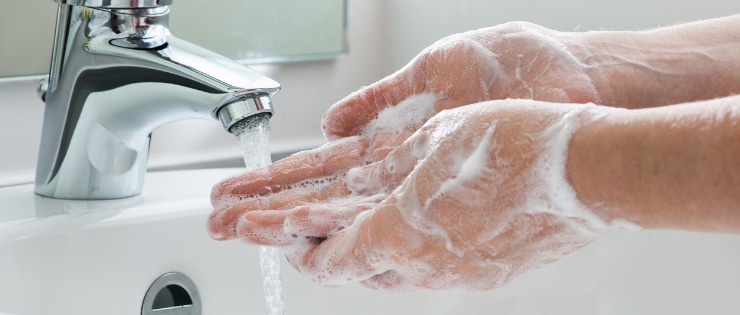
Medication
Some travelers take one capsule of Travelan before each meal to protect themselves from any dose of E-Coli that may be present. Don't take any medication without getting medical advice from your doctor.
Is Bali Belly Contagious?
Yes, bali belly can be contagious. Bacteria, viruses and parasites can all be transmitted from person to person and in food and water. This is why the advice on personal hygiene, particularly hand washing and not touching your face if you are looking after someone who is sick, is so important.
Cure for Bali Belly - Treatment Tips
Bali Belly can be a short, sharp 24-hour illness or one that can last for up to 4 or 5 days.
The following medications and remedies are available to treat Bali Belly:
- To treat diarrhoea - Diapet (Bali) or Imodium (Australia & Bali)
- To treat dehydration – drinks like Gatorade or Pocari Sweat (Bali)
- Antibiotics – while readily available in Bali without a script, they can do more harm than good if you don’t know what type of infection you have. Don’t take antibiotics unless they are prescribed by a doctor.
- For pain and fever - pain relief medication like Panadol and Nurofen
- For nausea and vomiting - medication recommended by a doctor or pharmacist
- Nausea - Charcoal tablets
If you are too unwell to visit a pharmacy, ask someone to go for you.
If one of your family members is suffering Bali Belly and you are caring for them, use latex gloves when cleaning up any mess. Keep their towel and soap away from yours and ask for the bed sheets to be changed regularly. Use hand sanitiser regularly and don’t touch your face.
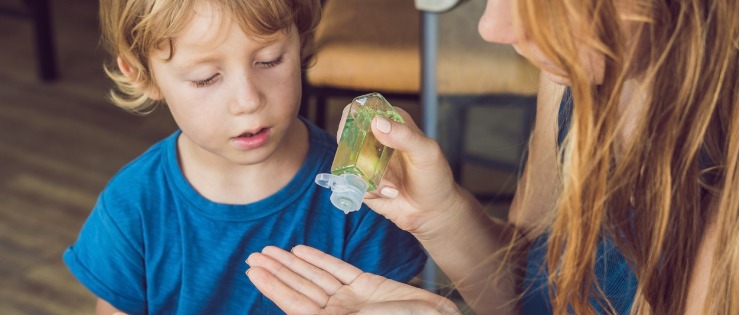
What to Eat and Drink While you Recover from Bali Belly
The biggest concern when you are suffering from a stomach upset is dehydration. If your urine is dark yellow, you need to rehydrate your body. In addition to increasing your water intake, you need to replace the lost electrolytes with rehydration drinks or sachets. Bali Belly can last up to 5 days so it is vital to stay hydrated to aid your recovery.
Eating the right food will also help with rehydration and ease the symptoms of Bali Belly.
For the first day or two, eat when you feel hungry and stick to a bland diet. It can take a couple of weeks to feel well enough to resume your usual diet. In the meantime, there are gastro-friendly foods you can eat to help with your recovery. If you are still in Bali, some of these might be difficult to find or prepare. If you are unwell home in Australia, you have more options in what you can eat.
- Water crackers – easy to digest and keep down, a perfect starter food
- Bananas – contain potassium which is an electrolyte lost in diarrhoea. Don’t eat any pre-peeled fruit.
- Apples or Applesauce – contains carbohydrates and pectin (a type of fibre) which can improve stool firmness.
- Potatoes – a source of carbs and calories which can also improve stool firmness.
- Rice – higher in fibre, it may decrease the frequency of diarrhoea.
- White toast – eat without any topping for an easy to digest meal that can give you some energy and improve stool firmness.
- Soup and stew – provides plenty of well-cooked vegetables, water and salt for re-hydrating and replenishing lost minerals. Skip the cream.
- Bone broth or clear soup – good for hydration and to replace lost salts.
- Avoid fatty or spicy foods and don’t drink milk, coffee or alcohol until you feel fully recovered.
What is a Natural Remedy for Bali Belly?
Regular travellers to Bali have many theories on what works and what doesn’t when it comes to Bali belly treatment and remedies. Some natural remedies for Bali Belly include:
- Raspberry Cordial. A Charles Sturt University research study showed raspberry and blackcurrant cordials and juice can kill 12 different types of bacteria. No human clinical trials have been conducted, so it is impossible to say that they prevent stomach bugs.
- Coconut Juice. The green coconuts of Bali are thought to help prevent and cure Bali Belly as the juice is full of minerals to boost your immune system and rehydrate your body.
- Probiotic Drinks. Some people believe that drinking Yakult for a few weeks before travelling and while in Bali will increase the good bacteria in their gut to fight off any nasty stomach bugs. This is not medically proven so still take all other precautions.
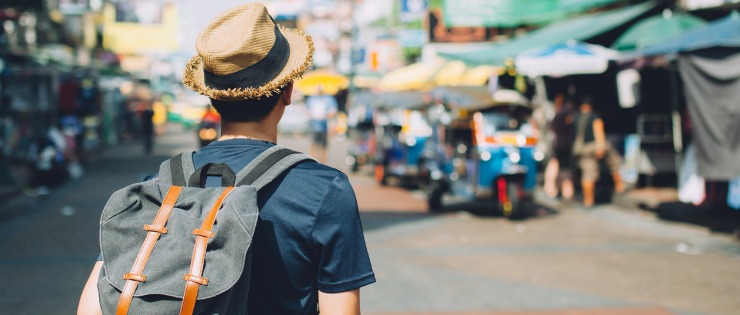
Risk of Other Food-Borne Infections
In rare cases, someone suffering from food poisoning doesn’t recover in the usual timeframe of 24 hours to one week. They may be suffering from a complication of Bali Belly or a worse infection.
Tapeworms
Tapeworms are found in undercooked meat particularly pork, beef and fish. The illness can range from having few symptoms to life-threatening problems. Infected people can pass on the infection through not washing their hands before preparing food. Symptoms can include abdominal pain, diarrhoea, fatigue, weight loss, nausea, vitamin and mineral deficiencies. Don’t eat any raw or undercooked meats and avoid fruits and salad while travelling.
Giardia
A gut infection caused by a small parasite that attaches to the large intestine in large numbers. Diarrhoea and stomach cramps are symptoms that usually appear seven to ten days after infection. The parasite can infect people through polluted water, eating uncooked food or food prepared by someone with Giardia who didn’t wash their hands after using the toilet.
Salmonella
Another illness caused by undercooked poultry, salmonella is also found in seafood, meat, peanuts, fruit and vegetables. Symptoms include stomach cramps, diarrhoea and fever and usually develop 12 to 72 hours after eating contaminated food. Recovery takes four to seven days in healthy people. The only treatment required is plenty of fluids. Children, the elderly and people with suppressed immune systems are most at risk of serious illness, even death.
Campylobacter
The most common source is undercooked poultry but can be in the water source of developing countries. The infection can last one week and cause diarrhoea, vomiting, stomach cramps and fever.
Hepatitis A
Food and water can become contaminated by a restaurant worker with hepatitis A. Reduce your risk of contracting hepatitis A while travelling by avoiding uncooked food. It can take 2 to 7 weeks after exposure before any symptoms begin. The symptoms can include extreme tiredness, feeling sick and not hungry, weight loss, pain on your right side around your liver, fever, sore muscles and yellow skin. It will usually take a few months before you feel better. A hospital stay may be required if there are problems with your liver. A blood test will show if you are infected or have been infected in the past.
Can You Get Bali Belly After Returning Home?
Yes, if you contract food poisoning late in your trip the symptoms of Bali Belly may not be apparent until after you return home. If you are still feeling the effects of Bali belly after returning home, see your GP. You may need to provide a stool sample to confirm which bacteria is causing the illness so the most effective treatment can be prescribed. Unfortunately, one attack of Bali Belly doesn’t make you immune for your next trip.

Precautions and Other Risks to Be Aware of Before Your Bali Holiday
The Smart Traveller website recommends visiting your GP or travel clinic eight weeks before you are due to travel for a checkup and medical advice.
Some doctors recommend the oral cholera vaccine to reduce the risk of bali belly - it has been found to reduce the incidence of traveler’s diarrhoea by half as it suppresses the E. coli bacteria.
You may also need a vaccination for Typhoid and Hepatitis A. Make sure you and your family are up to date on all vaccinations. If you are planning an extended trip to Bali, the rabies vaccination may be recommended.
You can buy a Diarrhoea First Aid Kit after a consultation with a doctor, or see your local GP for any recommended medication to take to Bali with you.
Other Health Risks When Traveling in Bali
Any developing country has risks for Australian travelers. Due to the sheer number of travelers and risky behaviour, one Australian dies in Bali every week through accident or illness.
Other serious non-food borne risk include:
Open Wounds
If you have an accident or injury (even very minor) treat the wound immediately with antiseptic and keep covered with a clean bandage. In the tropical climate of Bali, a wound can become infected very quickly. Visit a pharmacy or hospital if it looks infected.
Mosquito-borne Illnesses
Avoid being bitten by mosquitoes as they can carry dengue fever, chikungunya, Zika virus and malaria. Cover your skin with loose clothing and use an insect repellent during the day and night. Spray your room to kill any mosquitoes in the room before going to bed.
Animal Bites
If you are bitten or scratched by a dog or monkey in Bali, wash the wound with soap and water immediately. Seek urgent medical treatment as some dogs carry rabies.
Methanol Poisoning
Alcoholic spirits produced in Bali can contain methanol and other harmful substances. Only drink alcohol at reputable licensed premises.
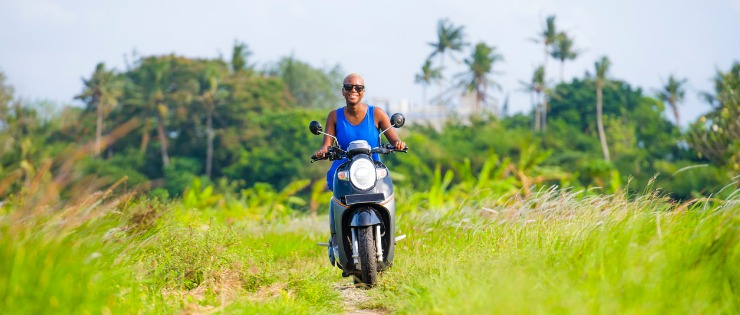
Take out Travel Insurance
If you are planning a trip to Bali, it’s important to arrange travel insurance before you leave.
Hundreds of Australians are involved in serious accidents in Bali each year. Some need expensive hospital stays in Bali or medical evacuation back to Australia after an accident or illness to receive specialist health care.

Need Travel
Insurance?
We've got you covered
Call 1300 134 060 or Get a quote